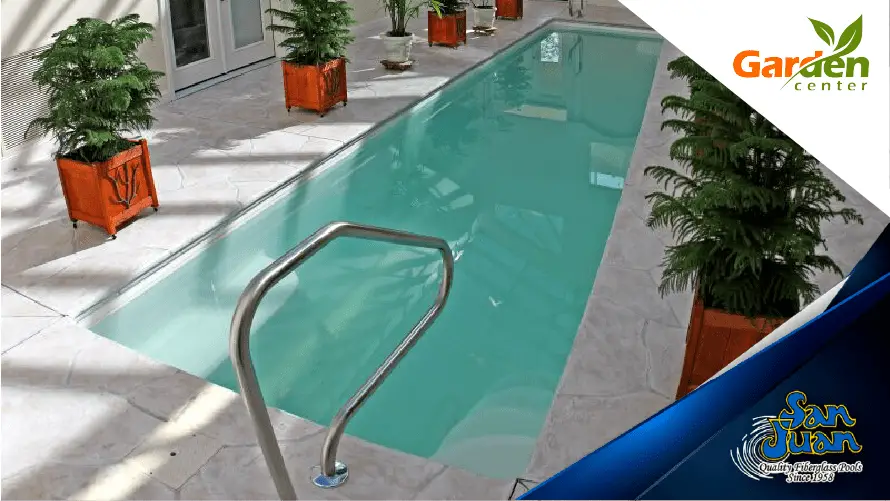Table of Contents
- Las Cruces: The Ideal Pool Destination
- Climate and the Need for a Pool
- What Drives the Costs?
- Material
- Labor
- Permits
- The Fiberglass Advantage
- Durability
- Maintenance
- Saltwater vs. Chlorine: A Cost Perspective
- Benefits of Saltwater
- Steps in Pool Installation
- Excavation
- Shell Installation
- Finishing Touches
- Financing Options
- How to Make Your Dream Pool Affordable
- Conclusion
- Summary and Next Steps
Las Cruces is not just another city in New Mexico; it’s a community with a unique blend of culture, climate, and exceptional quality of life. What better way to complement this lifestyle than by installing a saltwater fiberglass pool right in your backyard? At Pools by Garden Center, we specialize in the design and installation of top-quality fiberglass pools. In this comprehensive guide, you’ll get an insider’s view into everything from why fiberglass is the material of choice to how to finance your dream pool.
Why Choose Fiberglass Pools?
Fiberglass pools have long been hailed for their durability, ease of maintenance, and aesthetic appeal. Unlike traditional concrete pools, these sleek designs don’t crack easily and require fewer chemicals. This makes them the ideal choice for those who prefer saltwater pools—a service that we exclusively offer.
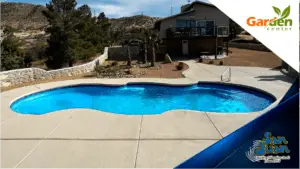
The Importance of Location
Selecting the perfect spot for your pool is crucial. Not only should you consider the aesthetics and view, but also take into account the terrain, property value, and even local zoning laws. The last thing you want is to run into legal complications after your pool is already half built.
Permits and Regulations in Las Cruces
If you’re a resident of Las Cruces, you’ll need to be familiar with specific building permits and regulations that apply to pool installations. For instance, a pool fence is a must to meet safety standards. We navigate these regulations daily and can help streamline the permit process for you.
What Drives the Costs?
Material
When it comes to installing a pool in your Las Cruces home, the choice of material plays a critical role in determining both the upfront and long-term costs. At Pools by Garden Center, we exclusively deal in fiberglass pools, a choice driven by its numerous advantages over other materials like concrete or vinyl liner.
Fiberglass: The Ideal Material
The fiberglass material we use comes from our trusted supplier, San Juan Fiberglass Pools. These pools are manufactured to the highest industry standards, ensuring a durable and aesthetically pleasing result. Unlike concrete pools, which can crack over time and require resurfacing, fiberglass pools maintain their structure and beauty for years, minimizing maintenance expenses in the long run.
Costs Upfront Vs. Long-Term
While fiberglass pools may command a slightly higher upfront cost than their vinyl counterparts, their long-term benefits make them a cost-effective choice. The surface of a fiberglass pool is non-porous, which means fewer chemicals are needed to maintain water quality, thus lowering your ongoing chemical costs. In addition, the smoother surface reduces the need for frequent cleaning, saving both time and money.
Quality Equals Savings
There’s an old adage that says, “You get what you pay for,” and it couldn’t be truer when selecting a pool material. Opting for cheaper materials may seem like a good idea initially, but maintenance and potential repair costs can quickly add up, negating any upfront savings. Fiberglass, though a premium material, eventually pays for itself through reduced maintenance costs and longevity.
Material and Saltwater Pools
One of the benefits of choosing fiberglass is its compatibility with saltwater systems. Because we only do saltwater pools, it’s essential that the material can withstand the salt’s corrosive effects. Fiberglass excels in this aspect, maintaining its luster and structural integrity even in saltwater conditions.
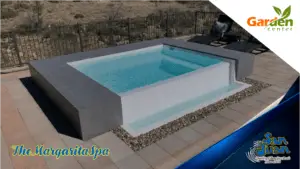
The Bottom Line
Ultimately, the material you choose for your pool will influence not just the initial installation cost but the overall lifetime cost of the pool. Fiberglass, with its minimal maintenance needs and durability, offers a long-term cost advantage that homeowners will benefit from for years to come. At Pools by Garden Center, we also provide financing options to make this high-quality material an affordable choice for your dream pool.
Labor
While material costs are a significant part of any pool installation budget, labor is another crucial factor that can influence the final price tag. Since we specialize in installing fiberglass pools, the labor requirements are often different from those of concrete or vinyl pools. Here’s a detailed look at what goes into the labor aspect of installing a pool in your Las Cruces home and how it affects the overall costs.
Skilled Workforce: A Necessity, Not an Option
In the pool industry, skill and experience make all the difference. Installing a fiberglass pool is a specialized job that requires a trained workforce. Our team is not just skilled but also highly experienced in handling all aspects of fiberglass pool installations, right from excavation to the final touches.
Complexity of the Project
Every pool installation is unique, and some may require more intricate labor than others. If your project involves additional features like integrated waterfalls, spas, or complex shapes, the labor cost will understandably increase. At Pools by Garden Center, our expert designers and skilled laborers are equipped to handle even the most elaborate designs.
Timing Matters
The time of year you choose for your pool installation can also affect labor costs. Peak seasons may result in higher labor rates due to increased demand. However, we try to maintain a consistent pricing structure year-round, allowing you to plan your pool installation according to your schedule without worrying about fluctuating labor costs.
Efficiency and Speed
One of the advantages of choosing fiberglass pools is the reduced installation time, which naturally translates to lower labor costs. Unlike concrete pools, which can take several weeks to complete, a fiberglass pool can be installed in as little as one to two weeks. This efficiency is possible due to the pre-fabricated nature of fiberglass pools, allowing for a quicker, smoother installation process.
Permits and Regulations
Before starting any pool installation, obtaining the necessary permits is essential. While this is not a direct labor cost, the time spent on ensuring all regulations are met is part of the labor that goes into making your pool project a success.
The Bottom Line
Labor is an unavoidable cost in pool installation, but it’s also one where quality should never be compromised. Choosing a trusted provider like Pools by Garden Center ensures you receive top-notch, efficient service, reducing the likelihood of future issues that could result in additional labor costs. With our financing options, you can spread out the expense, making it easier to invest in quality labor for a pool that will last you for years to come.
Permits
Securing the necessary permits is a crucial, often overlooked aspect of pool installation that can significantly impact your budget. The process of obtaining these permits can be time-consuming and occasionally costly, depending on your location and the specific requirements of your project. At Pools by Garden Center in Las Cruces, we have extensive experience navigating this bureaucratic landscape, and here’s what you need to know about how permits can drive the cost of your pool installation.
Local Regulations and Zoning Laws
Each municipality has its own set of regulations and zoning laws pertaining to pool installations. These laws can affect various aspects of your pool project, from its size and location on your property to safety features like fencing and covers. Navigating these regulations can be complicated, but it’s essential for staying compliant and avoiding fines or mandatory alterations down the line.
Administrative Fees
Submitting applications for permits often comes with administrative fees. These can vary widely depending on the jurisdiction and the complexity of your project. While these fees generally make up a small portion of the overall budget, they’re a necessary expense that should not be overlooked when calculating costs.
Inspections
Most local authorities require multiple inspections throughout the pool installation process to ensure compliance with safety regulations and building codes. While this is generally a positive step for the homeowner, ensuring a well-built and safe pool, each inspection can come with its own fee, driving up costs.
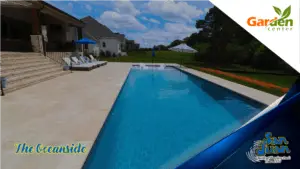
Time is Money
The time it takes to obtain the necessary permits can also indirectly affect your overall budget. Delays in getting approval mean delays in the installation process, which can, in turn, lead to increased labor costs if the project schedule gets extended. At Pools by Garden Center, we work to streamline this process as much as possible, leveraging our experience and local knowledge to avoid unnecessary delays.
The Benefits of Professional Assistance
One advantage of working with an experienced pool installation company is that we can handle most of the permitting process for you. Our familiarity with local regulations and requirements in Las Cruces allows us to anticipate issues and resolve them before they become costly problems.
The Bottom Line
While permits might seem like just another piece of paperwork, they’re a critical component of a successful, legal pool installation. The associated costs can vary but should always be accounted for in your budgeting process. Partnering with an experienced company like Pools by Garden Center can help simplify this complex process, ensuring that all the legal boxes are ticked without unnecessary expenditure or delays. And with our financing options, even these costs can become more manageable, making your dream pool an attainable reality.
The Fiberglass Advantage
Durability
When it comes to installing a pool that will stand the test of time, durability is a factor that can’t be ignored. In the world of pool materials, fiberglass comes out on top for its superior longevity and minimal wear and tear over time. As a Las Cruces distributor of San Juan Fiberglass Pools, we at Pools by Garden Center are in a unique position to delve into why fiberglass pools offer unparalleled durability.
The Structural Integrity of Fiberglass
One of the most striking features of a fiberglass pool is its robust structural integrity. Unlike concrete pools that may crack due to temperature fluctuations or ground movement, fiberglass pools are engineered to withstand such pressures. The high tensile strength of fiberglass material allows for slight flexing, preventing cracks and reducing the likelihood of leaks.
Resilience Against Environmental Factors
Situated in Las Cruces, we’re no strangers to extreme weather conditions. Fiberglass pools display a remarkable resilience against environmental stressors like high temperatures and harsh UV rays. The material’s inherent properties ensure that it won’t fade, discolor, or deteriorate, even after years of exposure.
Low Maintenance, High Durability
One of the most appealing advantages of a fiberglass pool is its low maintenance requirement. The gel coat surface is non-porous, which means it inhibits the growth of algae and bacteria. You won’t have to scrub or use harsh chemicals to keep your pool looking new, which not only saves you time and money but also adds to the pool’s longevity.

No Need for Resurfacing
Unlike concrete or plaster-finished pools that require resurfacing every 10 to 15 years, a fiberglass pool’s surface can last for decades without needing such treatment. This is a significant long-term saving and another testament to the material’s durability.
Compatibility with Saltwater Systems
Given that we specialize in saltwater pools, it’s essential to mention how well fiberglass performs with saltwater systems. Salt can be corrosive to many materials, but the gel coat finish on a fiberglass pool provides an extra layer of protection, thus extending the life of the pool.
The Bottom Line
If durability is high on your list of priorities, a fiberglass pool is the way to go. The material’s strong, flexible composition, coupled with its low maintenance requirements, ensures that your pool will remain in excellent condition for years to come. At Pools by Garden Center, we back this up with solid warranties and flexible financing options, making a durable, long-lasting pool an affordable investment for your home.
Maintenance
When considering the long-term enjoyment of your pool, ease of maintenance is a critical factor. A fiberglass pool offers significant benefits in this area, making it a top choice for those looking for a low-hassle, high-reward swimming experience. As a dedicated distributor of San Juan Fiberglass Pools in Las Cruces, Pools by Garden Center is keen to shed light on the maintenance advantages you’ll enjoy with a fiberglass pool.
The Non-Porous Gel Coat Surface
One of the most defining features of a fiberglass pool is its smooth, non-porous gel coat surface. This quality makes it inherently resistant to algae and bacteria growth. Unlike concrete pools that can become breeding grounds for microorganisms due to their porous surfaces, a simple, routine cleaning is often all you need with a fiberglass pool.
Minimal Use of Chemicals
The non-porous nature of the fiberglass surface also reduces the need for chemicals like chlorine. You won’t have to regularly shock the pool to kill off algae or bacteria, making maintenance easier on both your wallet and the environment. This is particularly advantageous for saltwater pools, which we specialize in, as saltwater systems already use fewer chemicals than traditional chlorine pools.
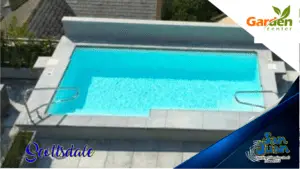
No Resurfacing or Repainting
Concrete pools require frequent resurfacing and repainting to maintain their appearance and integrity. With a fiberglass pool, these labor-intensive and costly procedures are virtually eliminated. The gel coat surface is incredibly durable and retains its appearance for many years, reducing long-term maintenance costs.
Quick and Easy Repairs
Should you ever face a maintenance issue, repairing a fiberglass pool is generally quicker and less disruptive than fixing a concrete or vinyl liner pool. Most minor damages can be easily patched without draining the pool, allowing you to get back to swimming sooner rather than later.
Lower Long-Term Costs
When you consider the costs of chemicals, resurfacing, and time spent on upkeep, fiberglass pools offer excellent value over the long term. They may have a higher initial cost compared to vinyl pools, but the lower maintenance requirements make them a more economical choice in the long run.
A Perfect Match for Saltwater Systems
Fiberglass pools and saltwater systems are a match made in heaven. The corrosion-resistant nature of fiberglass means that your pool will not suffer from the long-term exposure to salt, unlike other materials that may degrade over time.
The Bottom Line
If you’re looking for a pool that allows you more time swimming and less time skimming, scrubbing, and balancing chemicals, a fiberglass pool is your answer. At Pools by Garden Center, we offer various fiberglass pool designs to suit your needs, all of which come with the low-maintenance benefits inherent to the material. With our financing options, making the smart choice for easy maintenance has never been more accessible.
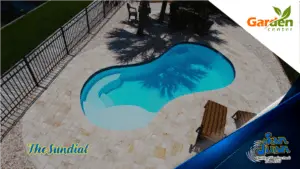
Saltwater vs. Chlorine: A Cost Perspective
Deciding between a saltwater and chlorine pool is a pivotal choice for any prospective pool owner. While chlorine pools have been the traditional option for many years, saltwater pools have gained increasing popularity for their array of benefits, including lower long-term maintenance costs. Specializing solely in saltwater pools, we at Pools by Garden Center are perfectly positioned to discuss the financial aspects of choosing a saltwater pool over a chlorine one.
Initial Setup Costs
It’s no secret that the initial investment for a saltwater pool system is higher than that of a traditional chlorine pool. A saltwater chlorine generator and other specialized equipment can add to the initial expenses. However, it’s essential to think of this cost as an investment that pays off over time.
Ongoing Chemical Costs
One of the most significant financial advantages of a saltwater pool is the reduced cost of chemicals. While chlorine tablets for a traditional pool can become a recurring expense, saltwater pools need far less chemical input. A bag of pool-grade salt is generally cheaper than chlorine tablets, and you’ll be purchasing it less frequently.
Maintenance Expenses
Saltwater pools require less frequent maintenance, which translates to cost savings in the long run. Fewer chemicals mean fewer trips to the pool supply store and less time spent balancing water chemistry. The money saved on chemicals and time can be substantial over the years.
Health-Related Savings
While not a direct financial benefit, it’s worth mentioning that saltwater pools are generally gentler on skin and eyes, reducing the need for lotions, eye drops, or other treatments that may be necessary after swimming in a heavily chlorinated pool. Over time, these minor expenses can add up.
Equipment Longevity
Saltwater systems are often touted for their longevity. A well-maintained saltwater chlorine generator can last many years, reducing the need for frequent equipment replacements. However, it’s crucial to note that other pool components like heaters may have a shorter lifespan in saltwater conditions. Make sure you invest in saltwater-compatible accessories to mitigate this aspect.
Resale Value
Homebuyers are increasingly looking for properties with saltwater pools, recognizing the benefits they offer. A saltwater pool can be an attractive selling point, potentially increasing your home’s resale value and making it a more appealing option on the market.
The Bottom Line
While the initial cost of setting up a saltwater pool can be daunting, the long-term savings on maintenance, chemicals, and potential health benefits can make it a wise financial decision. At Pools by Garden Center, we offer flexible financing options that make it easier than ever to invest in a saltwater pool that will save you money in the long run.
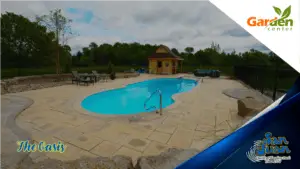
Steps in Pool Installation
Excavation
Embarking on a pool installation journey is an exciting venture. However, it’s also a complex process with multiple steps that require precision and expertise. One of the most critical phases of pool installation is the excavation process, and it’s one we at Pools by Garden Center take very seriously. As experts in the installation of fiberglass pools in Las Cruces, let’s break down what excavation entails and why it’s so crucial for a successful pool project.
Site Preparation and Evaluation
Before the first shovel hits the ground, there’s a lot of groundwork to be done—literally. It begins with a thorough assessment of your property to evaluate soil type, water table levels, and other geological factors. The objective is to understand the landscape conditions that will influence the excavation process and subsequent installation steps.
Marking and Setting Boundaries
Once the initial evaluation is complete, the next step is to mark the area where the pool will go. Precision is key here, as an inaccurate layout can lead to complications down the line. Typically, stakes and string are used to outline the pool’s shape, providing a guide for the excavation team.
Digging the Hole
The real action starts here. Using heavy machinery like backhoes and excavators, the digging process begins. It’s essential to dig to the exact specifications required for the particular pool model being installed. The depth and dimensions must be spot-on to ensure that the fiberglass shell will fit perfectly.
Soil Removal and Disposal
As the excavation progresses, the removed soil must be managed efficiently. Depending on the project’s scale and local regulations, the soil might be repurposed on-site for landscaping, or it might need to be hauled away for disposal.
Safety Measures
Safety is a priority during excavation. The area is typically cordoned off to prevent unauthorized access, and the excavation team adheres to safety protocols, including wearing protective gear and ensuring that the machinery is in optimal condition.
Checks and Balances
Throughout the excavation process, frequent checks are performed to ensure that everything is proceeding as planned. Measurements are taken continuously to make sure the hole’s dimensions are in line with the design specifications.
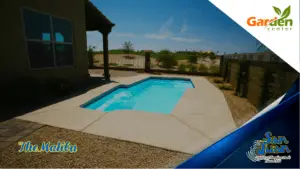
Prepping for the Next Steps
Once the hole is dug, it’s prepared for the next phases of the installation process, which may include leveling the ground, installing plumbing, and setting up for the fiberglass shell placement. The excavation sets the stage for everything that follows, making it a linchpin in the pool installation process.
The Bottom Line
Excavation may seem like just digging a hole, but it’s much more than that. It’s a complex and precise operation that lays the foundation—literally and figuratively—for your new fiberglass pool. With our years of expertise and dedication to quality, Pools by Garden Center ensures that the excavation phase of your pool installation is handled with the utmost professionalism and accuracy.
Shell Installation
Once the excavation process is complete, the next pivotal step in installing a fiberglass pool is the shell installation. This phase is critical because it’s the moment your pool truly begins to take shape. Being specialists in fiberglass pool installations in Las Cruces, we at Pools by Garden Center take every precaution to ensure that the shell installation is seamless, secure, and carried out with meticulous attention to detail.
Arrival and Inspection of the Fiberglass Shell
Before anything else, the fiberglass shell arrives at the project site. It’s vital to perform a thorough inspection to check for any damages that may have occurred during transport. Any issues must be addressed immediately to prevent complications later on.
Positioning the Shell
Once the shell passes the initial inspection, the next step is to carefully position it into the excavated hole. This is typically done with a crane, which lifts and lowers the shell into place. Precision is crucial at this stage to ensure the shell sits level and aligns with any pre-installed plumbing or electrical work.
Confirming Proper Fit
After the shell is placed, it’s essential to double-check the fit within the excavation. Measurements are taken to ensure the shell sits perfectly level and that all sides are evenly supported. Any discrepancies must be addressed immediately to avoid structural problems down the line.
Backfilling and Stabilizing
The next phase involves backfilling the space around the shell with material that offers good drainage, often a mix of sand and gravel. This process stabilizes the shell, ensuring it remains level and secure. Throughout the backfilling process, it’s critical to continuously check that the shell remains stable and level.
Plumbing Connections
At this stage, plumbing lines that were pre-laid during the excavation phase are connected to the pool shell. This includes attaching skimmers, return lines, and other plumbing essentials. Every connection is triple-checked for leaks and other issues.
Quality Checks and Water Testing
After the plumbing connections are made, a series of quality control checks take place. This ensures that the shell is secure, the plumbing is leak-free, and that everything is prepared for the final steps of the installation. Often, a small amount of water is added to test the shell’s stability and to check for leaks.
Initial Water Fill
Assuming all checks pass muster, the pool is then filled with water. This is a significant moment, not just symbolically, but also structurally, as the weight of the water helps to further stabilize the pool shell.
The Bottom Line
The shell installation is a defining step in the creation of your new pool. It demands an unparalleled level of precision, expertise, and quality control—all of which we at Pools by Garden Center provide with every installation. With our deep experience in installing fiberglass pools, you can rest assured that your pool shell will be installed to meet the highest standards of quality and durability.
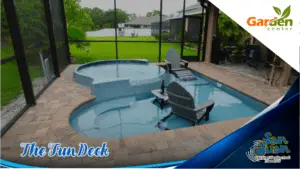
Installing a pool is a big financial commitment, but it also offers a lifestyle change that many find invaluable. By being aware of the pool installation costs in Las Cruces, you can make an informed decision that suits both your dreams and your wallet.

